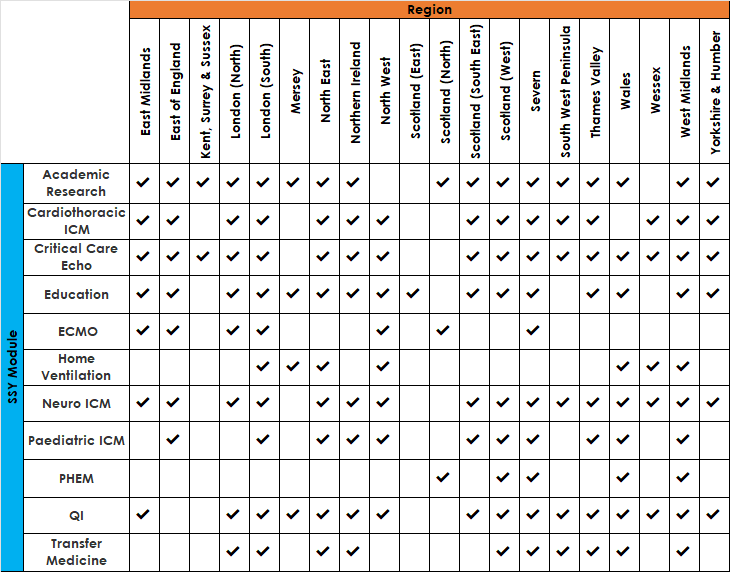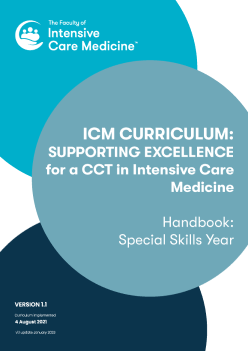Special Skills Years
The Special Skills Year (SSY) is a 12-month period of training occurring during Stage 2 of Single ICM CCT training. It is an opportunity for Single CCT Intensivists in Training (IiT) to develop expertise in a specific area directly relevant to ICM practise whilst benefitting patient care and the service alike.
Single ICM CCT IiT must undertake a year as described in the SSY Handbook.
An IiT can look to develop clinical or non-clinical competencies in line with the SSY curriculum. Single CCT IiT are advised to consider their SSY early and discuss with their TPD or RA to guide what is currently available and help arrange the SSY.
SSY options are as follows:
- Academic Research
- Cardiothoracic Intensive Care Medicine
- Critical Care Echo
- Education
- Extra-Corporeal Membrane Oxygenation (ECMO)
- Home Ventilation
- Neuro Intensive Care Medicine
- Paediatric Intensive Care Medicine
- PHEM Pre-Hospital Emergency Medicine
- Quality Improvement in Healthcare
- Transfer Medicine
Special Skills Year Handbook
To access further details about the current SSYs available in the ICM CCT Curriculum please download and the read the handbook below. It contains all the of the required learning objectives you must demonstrate in order for your Educational Supervisor to sign off your SSY Learning Outcome Completion Form in the FICM LLP.
SSY Region locations
The regions/nations in the UK where you can undertake the respective SSY modules are listed in the table below. This information was correct at the time of publishing (July 2024) and may differ from what is currently available in the training regions, please check with your TPDs/RAs for the most up to date information.
Where a particular SSY module is not available in an IiT's region, it is possible to apply to undertake the module in another region as a year of Out Of Programme Training (OOPT). This would then count towards ICM CCT.
IiTs wishing to undertake their SSY as an OOPT will need to liaise with the relevant region or placement provider to determine if there is any availability for them to undertake the respective module and must gain prospective approval from their TPD and Postgraduate Dean to do this.
Click here for detailed information and guidance on Out of Programme Training.

Dual/Triple CCT Programmes and SSYs
For doctors undertaking Dual CCT programmes in ICM and another specialty it is expected that their Special Skills Year will be undertaken in the other specialty, as this is the area of special expertise that they are developing. For example, a doctor undertaking Dual CCTs in ICM and Anaesthetics would spend an indicative 12 months acquiring their remaining capabilities in Stage 2 of their Anaesthetics curriculum.
SSYs in ICM Partner Specialties
There are specific acute medical specialties where areas of competence overlap with those of Intensive Care Medicine. The specialties encompassed in this mapping are:
- Acute Internal Medicine
- Anaesthetics
- Emergency Medicine
- Renal Medicine
- Respiratory Medicine
Doctors on the single ICM CCT training programme may develop their Special Skills in an ICM partner specialty if this meets the career intentions of the doctor as well as local training capacity and workforce requirements. As with all Special Skills Modules, this training will be dependent on their deanery/LETB having the required facilities and educational capacity to offer that training module. However, where possible doctors in ICM training should be supported in achieving their career development aims, and OOPTs may be considered (See Section 1.2 Local availability of Special Skills Modules in the SSY Handbook for further details).
The partner specialties all have GMC approved CCT curricula. Intensivists in Training should follow those curricula as appropriate to their level of prior training and experience in the respective specialty. For example, a doctor on a standalone ICM CCT programme, who entered ICM via Core Anaesthetic Training would be able to undertake Special Skills training in that specialty at the Anaesthetics Curriculum Stage 2 level; however if that doctor had entered ICM via Internal Medicine Training they would only have undertaken an indicative 12 months of Anaesthetics as part of their Stage 1 training; as such, if they wished to further develop their anaesthetic skills during their Special Skills Year they would only be able to work and train in Anaesthetics at Core level.
Supervision and assessment of these doctors in training would be carried out as established in the partner specialties. They would be required to demonstrate progression in the partner specialty as per that specialty’s assessment system and include this evidence as part of their portfolio to be reviewed by their ICM Educational Supervisor before they can be signed off for Stage 2 training.
Further Special Skills Years
The GMC have are now accepting amendments to the new curricula, and this would include the development of new SSYs. This would require an initial submission to FICMTAQ and then onto the GMC for approval. This process had been suspended with the implemtation of Excellence by Design and the development of new curricula.
Since the GMC required all Colleges/Faculties to submit new curricula, the process for approval of such curricula, and any additions to (such as new SSYs), has become lengthier and more robust, with specific criteria to take into consideration, and narrative in support.
As a general guide to the creation of new SSYs:
- There must be a deliverability reassurance, that the SSY syllabus can be delivered in similar units across the UK. It cannot be unit specific. For example an ECMO SSY must be deliverable in all ECMO units etc.
- The GMC will scrutinise the workforce need of such an SSY; an SSY cannot be submitted on interest factor alone, the workforce need must be demonstrated.
- The capabilities in the SSY curriculum must be beyond the scope of the existing CCT curriculum. This means that in general, where a capability is level 3 in the current syllabus, then there would be the expectation of a level 4 in the SSY.
- The general outline/template for the SSYs would be that found in the current SSY Handbook. In particular the detail found in 1.10 should be considered, including the mapping to the GMC's Generic Professional Capabilities framework (GPCs)
- An SSY is for an indicative year, of which the Intensivist in Training must spend at least 50% of their time clinical on an ICU. That being said there must be enough capabilities in the SSY curriculum to fill the remaining time.
- Mandating a particular course would not be permitted by the GMC, or a qualification which requires more than the time span of the SSY.
We suggest that before significant time or resources is invested in the development of any new SSY that you should first submit an initial enquiry to FICMTAQ (via contact@ficm.ac.uk) to establish if there is already a similar project underway (collaboration is encouraged). Following this, an initial draft proposal, taking into account the above points, should be submitted to TAQ for further consideration of its viability.
Want to know more?
Please visit our Training pages.

